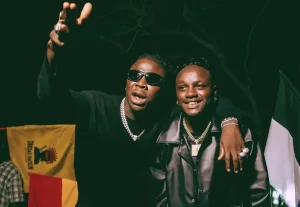It is the dream of many people to go from small-time artist to music superstar in a heartbeat. And digital distribution platforms such as Spotify, YouTube and Soundcloud hold out the tantalizing possibility of reaching an audience of millions. However, even if you can cut through all the noise and gain a dedicated following, earning enough royalty revenue to survive remains a major challenge for emerging artists.
Earlier this year, Berlin-based Irishman Alex Leonard decided to focus full time on his electronic music career, and no longer rely on web development to pay the bills. While music was not his main source of income, he had been a passionate electronic composer and producer for over a decade. Thus, he was under no illusions about the economic realities of the music industry.
But on analysing his royalty receipts, even he was surprised by the sheer volume of streams he would need to make ends meet. Then an idea came to him while in a record store. He decided to give listeners an artist’s perspective on the economics of being a musician in the digital age, so he wrote a blog post detailing the number of Spotify streams he would need to pay for a range of everyday items such as a litre of milk, a cup of coffee, and a month’s rent.
“I was about to buy a double LP on vinyl and the thought occurred to me – how many streams of my music would I need to actually pay for this? The answer turned out to be 8,459. The idea immediately resonated with me as a way to really understand what my streaming numbers mean in real-life terms.”
|
Item |
EUR |
Self-Release |
Label Release |
|
1 litre of milk |
€ 0.92 |
311 |
623 |
|
Coffee in a cafe |
€ 3.00 |
1,015 |
2,030 |
|
Reasonably priced dinner for 2 |
€ 40 |
13,535 |
27,069 |
|
Monthly rent (85m2 flat, “normal” area) |
€ 1,094 |
370,175 |
740,350 |
|
Monthly minimum wage |
€ 1,593 |
539,021 |
1,078,042 |
Source: https://alex.leonard.ie/
The results of his analysis were a “huge surprise” to most of his listeners, many of whom had never realised how many streams a musician needs to earn a basic living from recorded music. For example, he estimates that in order to earn the German monthly minimum wage of €1,593, he would need to rack up a staggering 539,021 streams.
The reactions have been quite interesting. In the case of other musicians, the reaction tends to be expressions of agreement, depression or anger. From listeners it often tends to be one of complete surprise – they just didn’t realise how little a musician earns from streaming.
Bear in mind that these estimates are for an artist self-releasing their music. For a lot of other musicians, they will require substantially more streams to earn the same amount once a distributor takes their cut, then the label does too, plus there may be multiple members of a band, producers etc. This could result in a band on a label needing not just hundreds of thousands of plays, but potentially millions of plays.
Releasing music under the name Ebauche and, more recently, Dronal, Leonard’s compositions combine subtle ambient tones with unique field recordings — some captured in the Bavarian alps, others in urban environments — accompanied on occasion by dark, fractured beats. While this type of music has reached a wider audience through streaming, particularly via highly popular playlists with names like “Ambient Relaxation”, artists find it difficult to convert often transient listeners into dedicated fans.
“The push towards mood-based algorithmic playlists means that whilst you might get a sudden boost from being listed in some playlist one month, that is unlikely to yield recurring listeners… I definitely worry that any sort of real connection with listeners through streaming platforms is impossible. Whilst technically it would be entirely possible, I don’t think it’s in their interests…”
In addition, artists are further squeezed by the use of “ghost artists”, whereby streaming platforms buy the rights to a catalogue of tracks outright from music production factories in order to pad out playlists, resulting in less revenue for the “real” artists in the queue. This is how artists with no social media presence or online footprint like Charlie Key and Greg Barley have amassed tens of millions of streams on Spotify.
Asked about the royalty collection process, Leonard is typically forthright. He explains that the procedure is confusing and labyrinthine, making it difficult and bureaucratic to track down what you are owed. For an electronic music artist, this is further complicated by the pervasiveness of remix sites like Mixcloud, which involve complicated licencing agreements.
“I often get the feeling that I’m almost certainly missing out on broadcast royalties – but I have no idea how to track these down. Then you have sites like Mixcloud, which in theory should be paying some revenues, but I don’t believe I’ve ever received a single cent from having my tracks used in multiple mixes on their site – and I have no way to find out how to collect them.
As far as streaming royalties go… per-track stream revenue varies wildly from fractions of a fraction of a cent to, well, fractions of a cent, and I’ll never know why it varies, or how it’s calculated.”
So how can fans help the artists they love earn a better income? One approach is to buy their music directly on a website like Bandcamp or switch to a streaming service with higher per-stream rates. In addition, merchandise and concert tickets also constitute an important source of revenue.
Better still would be for music lovers to demand a wholesale change in the way the music industry is run. That’s because while technology has reshaped the way we consume music, the industry itself continues to be stuck in the past in terms of rights and royalties. Yet technology can provide the answer.
One business which is looking to the future is Utopia Music. The business was founded in 2016 on the deep-rooted belief success in innovating an entire industry can only be achieved by looking holistically at the music industry value chain, and by leveraging modern technologies such as blockchain, to develop a new music ecosystem that rewards everyone.
By harnessing the power of big data and the accuracy and immutability of distributed ledger technology, which is able to listen to online and live sources to produce meaningful and timely reports on what is being played when and where, we can increase revenues as one play would equal one pay. Costs would be reduced in part by removing the myriad middlemen, and smart contracts would speed payments to struggling artists, rights owners and the neglected people behind the scenes who make the music we love.
What are we waiting for?







